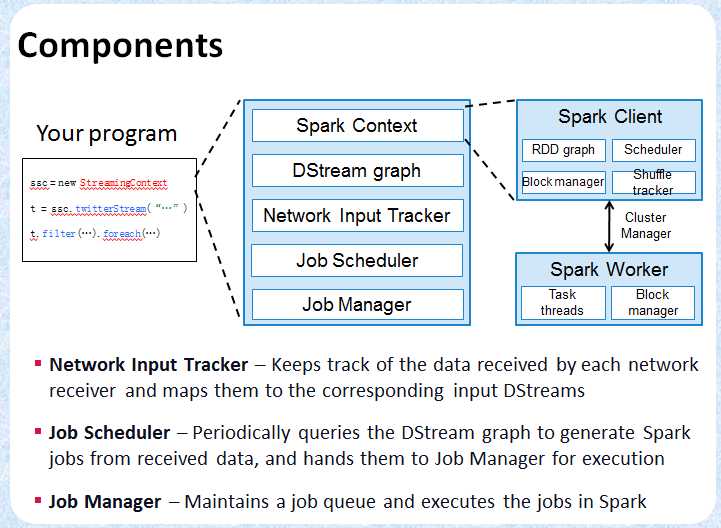标签:

/**
* Main entry point for Spark Streaming functionality. It provides methods used to create
* [[org.apache.spark.streaming.dstream.DStream]]s from various input sources. It can be either
* created by providing a Spark master URL and an appName, or from a org.apache.spark.SparkConf
* configuration (see core Spark documentation), or from an existing org.apache.spark.SparkContext.
* The associated SparkContext can be accessed using `context.sparkContext`. After
* creating and transforming DStreams, the streaming computation can be started and stopped
* using `context.start()` and `context.stop()`, respectively.
* `context.awaitTransformation()` allows the current thread to wait for the termination
* of the context by `stop()` or by an exception.
*/
class StreamingContext private[streaming] (
sc_ : SparkContext,
cp_ : Checkpoint,
batchDur_ : Duration
) extends Logging {
private[streaming] val graph: DStreamGraph = {
if (isCheckpointPresent) {
cp_.graph.setContext(this)
cp_.graph.restoreCheckpointData()
cp_.graph
} else {
assert(batchDur_ != null, "Batch duration for streaming context cannot be null")
val newGraph = new DStreamGraph()
newGraph.setBatchDuration(batchDur_)
newGraph
}
}
private val nextReceiverInputStreamId = new AtomicInteger(0)
private[streaming] val scheduler = new JobScheduler(this)
private[streaming] val waiter = new ContextWaiter
private[streaming] val progressListener = new StreamingJobProgressListener(this)
/** Add a [[org.apache.spark.streaming.scheduler.StreamingListener]] object for
* receiving system events related to streaming.
*/
def addStreamingListener(streamingListener: StreamingListener) {
scheduler.listenerBus.addListener(streamingListener)
}
/**
* Start the execution of the streams.
*
* @throws SparkException if the context has already been started or stopped.
*/
def start(): Unit = synchronized {
if (state == Started) {
throw new SparkException("StreamingContext has already been started")
}
if (state == Stopped) {
throw new SparkException("StreamingContext has already been stopped")
}
validate()
sparkContext.setCallSite(DStream.getCreationSite())
scheduler.start()
state = Started
}
class PluggableInputDStream[T: ClassTag](
@transient ssc_ : StreamingContext,
receiver: Receiver[T]) extends ReceiverInputDStream[T](ssc_) {
def getReceiver(): Receiver[T] = {
receiver
}
}
class SocketInputDStream[T: ClassTag](
@transient ssc_ : StreamingContext,
host: String,
port: Int,
bytesToObjects: InputStream => Iterator[T],
storageLevel: StorageLevel
) extends ReceiverInputDStream[T](ssc_) {
def getReceiver(): Receiver[T] = {
new SocketReceiver(host, port, bytesToObjects, storageLevel)
}
}
/**
* An input stream that reads blocks of serialized objects from a given network address.
* The blocks will be inserted directly into the block store. This is the fastest way to get
* data into Spark Streaming, though it requires the sender to batch data and serialize it
* in the format that the system is configured with.
*/
private[streaming]
class RawInputDStream[T: ClassTag](
@transient ssc_ : StreamingContext,
host: String,
port: Int,
storageLevel: StorageLevel
) extends ReceiverInputDStream[T](ssc_ ) with Logging {
def getReceiver(): Receiver[T] = {
new RawNetworkReceiver(host, port, storageLevel).asInstanceOf[Receiver[T]]
}
}
/**
* Create a input stream that monitors a Hadoop-compatible filesystem
* for new files and reads them using the given key-value types and input format.
* Files must be written to the monitored directory by "moving" them from another
* location within the same file system. File names starting with . are ignored.
* @param directory HDFS directory to monitor for new file
* @tparam K Key type for reading HDFS file
* @tparam V Value type for reading HDFS file
* @tparam F Input format for reading HDFS file
*/
def fileStream[
K: ClassTag,
V: ClassTag,
F <: NewInputFormat[K, V]: ClassTag
] (directory: String): InputDStream[(K, V)] = {
new FileInputDStream[K, V, F](this, directory)
}
private[streaming]
class TransformedDStream[U: ClassTag] (
parents: Seq[DStream[_]],
transformFunc: (Seq[RDD[_]], Time) => RDD[U]
) extends DStream[U](parents.head.ssc) {
require(parents.length > 0, "List of DStreams to transform is empty")
require(parents.map(_.ssc).distinct.size == 1, "Some of the DStreams have different contexts")
require(parents.map(_.slideDuration).distinct.size == 1,
"Some of the DStreams have different slide durations")
override def dependencies = parents.toList
override def slideDuration: Duration = parents.head.slideDuration
override def compute(validTime: Time): Option[RDD[U]] = {
val parentRDDs = parents.map(_.getOrCompute(validTime).orNull).toSeq
Some(transformFunc(parentRDDs, validTime))
}
}
spark streaming 1: SparkContex
标签:
原文地址:http://www.cnblogs.com/zwCHAN/p/4274802.html